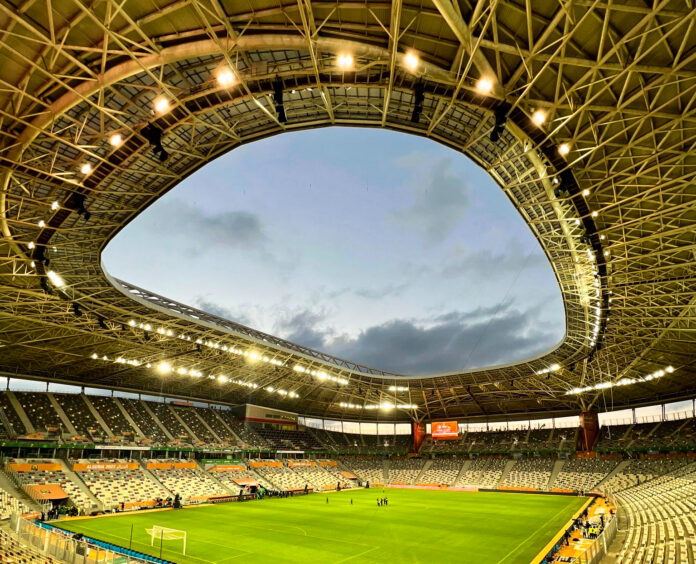Africa is witnessing rapid investment in sports infrastructure, with Morocco building the largest football stadium in the world ahead of the 2030 World Cup. Experts believe the conditions now exist for this infrastructure to drive economic prosperity.
Bonface Orucho, bird story agency
Africa continues to strategically fortify its sports infrastructure, especially stadiums, not only to nurture its abundant talent but also to harness the lucrative economic potential of the sector.
Morocco is currently on track with the development of a massive 115,000-seater stadium as it prepares to host the 2030 World Cup, jointly with Spain and Portugal.
Last month, the country’s National Agency for Public Facilities (ANEP) unveiled a consortium led by Oualalou + Choi of Morocco and US multinational design company Populous as the selected design contractors of what will become the largest stadium in the world. That title is currently held by North Korea’s Rungrado 1st of May Stadium in Pyongyang.
Moroccan architect Tarik Oualalou, the lead architect of the project, describes the stadium as “an embodiment of the great tradition of Moroccan hospitality.”
Set to be completed by 2028, the stadium will be located on a 100-hectare space in Banslimane, some 38 kilometers east of Casablanca.
Beyond this mega stadium, several other countries are building stadiums, breathing new life into the continent’s domestic sporting future.
In Benin, for instance, a 2018 sports strategy launched by President Patrice Talon targeting building 56 sports stadiums from scratch is showing substantial progress. According to FIFA, 22 of the 56 facilities are in advanced stages of construction.
Ivory Coast and Ghana, hosts of the recent Africa Cup of Nations and the Africa Games respectively, unveiled remarkable stadium projects ranging from newly-developed structures to revamped arenas, to accommodate the events.
With Kenya, Uganda and Tanzania set to host AFCON 2027, there are also more stadium facilities in the pipeline in East Africa. In Kenya, construction work on the new 60,000-capacity Talanta Stadium started in March. Similar new projects are in the pipeline in Uganda and Tanzania.
As these state-of-the-art stadiums take shape across the continent, industry experts foresee a lucrative sports business opportunity in the form of stadium naming rights, which could offer countries an avenue to bolster their economies, while elevating sporting prowess, thanks to new training and game facilities.
According to Gabriel Ajala, the founder of Africa Sports Unified, a pan-African and developing markets sports business platform, this market opportunity is viable if stakeholders can “think long-term and work collaboratively to build a viable and entertaining product.”
“Brands want the exposure from naming rights, amongst other ROI. If they do not see this, then it will not make viable sense for them to invest,” he explained.
Already, this model has proven viable globally with the Football Benchmark, an analysis and football data platform, highlighting that stadium naming rights are ranked third among commercial avenues for clubs, trailing only shirt sponsorships and kit supplier deals.
“Monetizing stadium names has been a rising trend globally in the past decades, as it promises to bring extra revenue to clubs,” the Football Benchmark explains on its website.
While this sports business model is nascent in Africa, naming rights programs, which market the names of stadiums for the interests of a company or a club, have begun to establish themselves across the continent.
The Bank of Kigali Group, for instance, acquired naming rights to the Kigali Arena, which led to its rebranding to the BK Arena. The US$5.4 million deal is active until 2026. A similar deal is active in Uganda’s Kampala Capital City Authority stadium. In 2020, South African telecommunications company MTN acquired naming rights to the stadium for 10 years.
In Africa, this model is most common in South Africa, where at least five major stadiums have struck naming rights deals with different brands, generating substantial revenues for the stadiums.
The First National Bank has owned naming rights for the FNB Stadium since 1989.
More brands have recently shown interest in naming rights deals across different stadiums in South Africa. In 2021, courier company DHL Express acquired naming rights to the Cape Town Stadium for four years, with a possible extension. The DHL deal generates more than US $700,000 annually.
Dubai logistics heavyweight DP World, which has built a substantial business in Africa, acquired rights to the Wanderers Stadium in Johannesburg in 2022, replacing Imperial Logistics as the naming rights holder for the cricket stadium.
Deals extend beyond football and cricket. Hollywoodbets, a betting company, enhanced its affiliation with KZN Rugby in 2023. The betting firm is now sponsoring the club in a deal that includes naming rights for the 52,000-capacity Kings Park Rugby stadium in Durban.
Notably, stadium naming rights deals hold the potential to fuel this sports market on the continent, which is projected to grow by an annual rate of 8% over the next 3–5 years, according to the 2023 PwC Global Sports Survey. PwC valued Africa’s sports market at US$7 billion in 2018.
However, as Ajala explained, Africa’s broader sports and economic ecosystem needs to thrive for this model to achieve its full potential.
“If the stadium isn’t packed and the teams are performing at their highest level with the most exposure, then brands may be deterred from this,” he said.
“The standards of living across the continent need to improve so that people have the disposable income to attend games and travel for major sporting events to fill out the stadiums,” he added.
bird story agency
Useful link: https://populous.com/populous-and-oualalou-choi-win-global-architectural-design-competition-for-moroccos-grand-stade-de-casablanca



